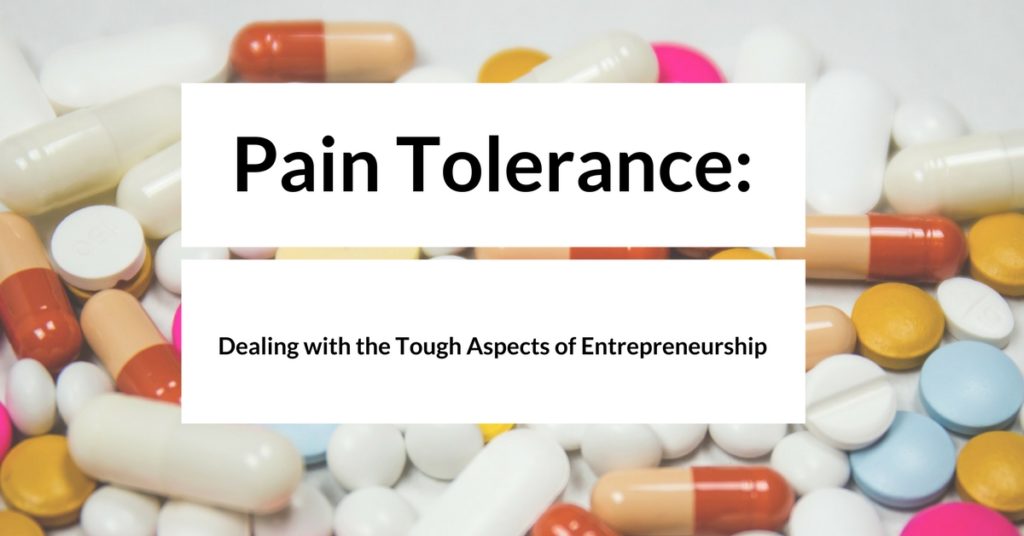Being a business owner is an exciting and noble pursuit. In fact, business owners, not politicians as they like to claim, are the ones that create jobs in our economy and help our society grow. When you build a business that is profitable and growing, there are also personal gains in the form of prestige, financial rewards, and other trappings of success.
However, the path is long and winding from your initial business plan to winning in the marketplace with enduring business results. For many, the tools and preparation for the entrepreneurship journey focus on strategy, product development and improvement, marketing, and hiring top talent. However, there is one key characteristic that many entrepreneurs overlook, pain tolerance.

When I received my first opportunity to be a CEO, I was 36 years old. My manager and friend was handing over the reigns to me and told me, “You have the skills to lead the business, but no one is emotionally equipped to be CEO for the first time. You will, however, develop the pain tolerance and emotional tools to win long term.” What I soon realized was that the loneliness of leadership is real. Once you sit in the CEO chair, you are viewed through a lens that creates unfair expectations, assumptions and worst of all, fear. In the organization, you have no peer and no one has the level of accountability that you do. As the leader, you have many people interacting with you on a daily basis, but there are precious few with whom you can share feelings, goals and fears. The limited space to share drives the feeling of isolation.
So how do we reduce the layers of anxiety that can suffocate leaders?
I recommend making it a priority to build an advisory board of former CEOs and senior business leaders. Why? You need people to talk to who will guide you, ask probing questions, and allow you room to ask for guidance without judgement. A lot has been written about building an advisory board. I believe that the time and funds invested to do so will pay for itself many times over. Additional sources of knowledge can be found by developing your personal network into a competitive advantage.
For years, I overlooked the clear and present value of gaining business insight in a proactive manner. I focused solely on my own firm and kept my calendar free from business-owner breakfasts, after hours mixers and CEO organizations. Big mistake. As I matured, it became obvious to me how many awesome business leaders lived in my town and were willing to share points of progress and pain that were crucial to my growth as a leader. Most distressing was the realization that the cost of a cup of coffee could have accelerated my thinking. Lesson learned: you are not too busy to become involved in your community and maintain a learning attitude.
Whether you lead a team of 3, 30 or 300, your chair is a magnet for big decisions that come prepackaged with stress. As a CEO of a small firm, a huge decision often takes the form of who you hire, and who is let go from the team. Eliminating poor performers is easy and obvious. The pain comes from making personnel decisions that are right, but unpopular when you part ways with those that are nice, but average. People love them, but they are taking up a chair reserved for a high performer. The reality is the longer you put it off, the more damage you cause because the epidemic of average spreads like a virus. Holding on to average people when you should be chasing excellence is business malpractice and punishable by slow growth.
Big decisions carry both the risk of bad results and the opportunity for significant gain. How do you behave when your team loses a key deal to competition or layoffs become necessary to preserve long term viability? Letting people go who have done nothing wrong is emotionally hard, but remember, we chose to build a for-profit business and that means doing tough things to protect the larger mission and winning long term.
People say dumb things all the time.
For example: It's just business, it's not personal is in the top 10. The truth is it is always personal. Just like your team, you may have kids, a spouse, health issues, financial strain, and any number of concerns that impact your ability to focus. The business reality is that you have to take the time to understand that what happens outside of the office is a critical factor that drives success. So, as a leader make sure your environment fosters work life integration. Productive people need to know that working a weekend to meet a deadline is blended with their ability to take off at 11:00 to attend a school event for their kids. Lowering standards, ping pong tables, beer bashes and such were never my thing. However, if you, as a leader, expect extra effort in crunch time for the firm, then allowing space for people to handle their personal items during work time is only a fair exchange.
Finally, learn this powerful question when working with your team during performance conversations: Is there anything going on that is affecting your ability to be productive? Remember, very few people perform at a high level under significant pain or stress. Care for your team and they will care for you and your business.
Sometimes, you just feel like giving up. People talk a lot about a “fearless leader.” It's bull$#!%. Leaders have fears. It's the courage to push through and find solutions to protect and grow your business that makes you special. But what helps you overcome fear, uncertainty and doubt? For me, reading is a productive tool. Books on leadership and building winning teams allow me to read, reflect and be inspired by people with varied backgrounds and points of view. I can be challenged without losing face publicly, and it keeps me from being isolated by my own limitations. Writing allows me to break through personal barriers and jump start self-reflection.
The next time you have a tough problem that needs your attention, take time and write a single page document that outlines the problem, identifies options for moving forward, and some requests for feedback from a few of your trusted advisors or key employees. Whether you share the note or use it for personal thinking you have attacked an area that causes pain or confusion and your mind opens to sources of solutions.
Pain tolerance is required to win as an entrepreneur, and the insights I've addressed above have helped me and those I mentor to respond positively to the challenges of leadership. Leadership is a tremendous responsibility and being up to the task requires the strength to push through when things are tough without transferring that stress to your team. As we build our leadership strength, we must let go of the illusion that w have to have all the answers. In reality, it’s our ability to extend our thinking by leveraging the wisdom of others so we progress in times of stress and uncertainty. Our journey is sometimes rocky, but the satisfaction of being a job creator and building a winning firm is well worth the price.



0 Comments